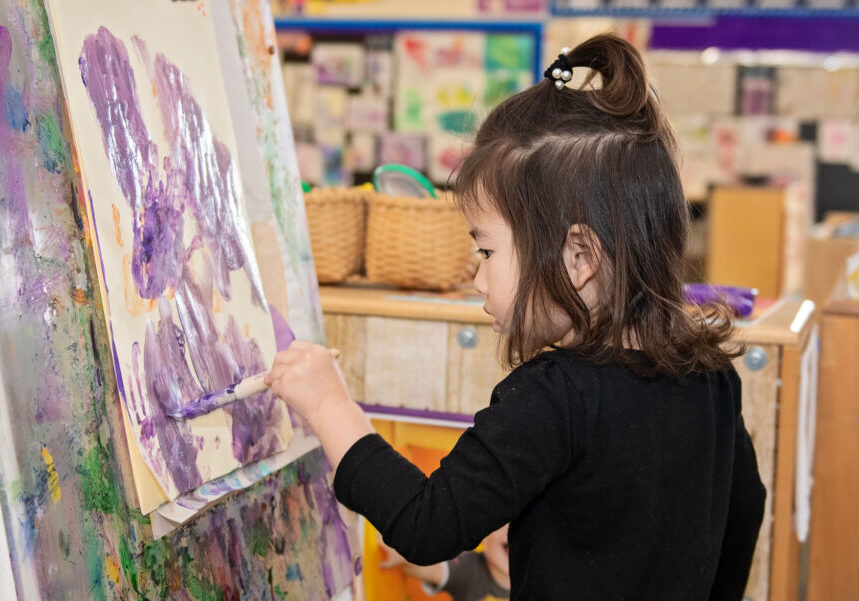I want my son to love books – so I began reading to him when he was tiny. Despair descended when, at six months old, he was more interested in eating books than reading them. But I wiped off the drool and kept reading.
My son loves books now. But my concern for boys’ language development persists. The National Center for Educational Statistics reports boys start school slightly behind girls, and as they continue boys don’t close the gap – it widens. Boys’ reading and writing skills lag behind girls’ even into college.
Building Boys’ Literacy
While some differences are biologically built in, the way parents talk to boys matters too, according to Diane McGuinness, PhD, author of Growing a Reader from Birth: Your Child’s Path from Language to Literacy. Parents tend to use different styles of speaking with sons than daughters.
Studies show parents have longer, more elaborative conversations with girls. They ask more questions and engage girls in more verbal interaction. With boys, parents tend to use a repetitive style, asking simple questions again and again until the right answer is given, then changing topics entirely. McGuinness notes this conversation style isn’t as effective for language development.
Reading aloud can build language skills. But if you’ve got a young boy, you’ve likely discovered that many “boy-books” contain nothing but pictures of vehicles and their names. These “types-of-tractors” books encourage the repetitive style of conversation: “Can you point to the roller?” “Good. Now can you say backhoe?” Though they can be a starting point for a rich, elaborative conversation with your child, there’s no story unless you make one up. And finding the energy and inspiration for storytelling after chasing a preschooler all day is almost as hard as browsing for books with that child in tow.
Rhythmic, rhyming stories are preschool favorites. “The language has to flow, but it can’t be too wordy,” advises Jenny Rich, reading specialist and editor of the website Ethan’s Bookshelf. Plot and illustrations are also important. “We want kids to recognize there is meaning to be derived from books,” adds Rich. The best stories transport listeners from beginning to end, offering fun surprises along the way.
Great Read-Aloud Books for Boys Age 2-5
If you’re not excited by the thought of naming construction equipment again tonight, take heart. These clever read-aloud books are parent-recommended and little-boy approved (find them at your bookstore or library):
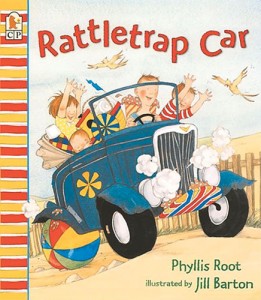 Rattletrap Car by Phyllis Root
Rattletrap Car by Phyllis Root
In this tumultuous story of a family trip to the lake, the rattletrap car falls apart, piece by piece. The characters ingeniously mend the car with toys and tasty treats. Bonus: great sound effects for parental performance.
 Shiver Me Letters: A Pirate’s ABC by June Sobel
Shiver Me Letters: A Pirate’s ABC by June Sobel
“R” says the Captain to his crew: Find me more letters! Young readers delight in pointing out letters in curious places and shouting “R” with the mates on this pirate ship. Blow me down – this ABC can’t be beat.
 Duck on a Bike by David Shannon
Duck on a Bike by David Shannon
Follow duck on his first bike ride past each animal on the farm. Though they scoff at first, the curious animals can’t pass up of the chance to ride bikes, too. This is a beautiful, noisy barnyard on wheels.
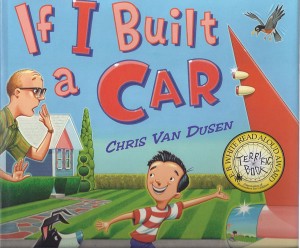 If I Built a Car by Chris Van Dusen
If I Built a Car by Chris Van Dusen
Jack builds a space-age car, chock-full of special features like a pool and snack bar. This book has a wonderful cadence and dynamite pictures. Though it’s wordier than the others, you’ll find it easy to shorten the text for young readers.
 My Truck is Stuck! by Kevin Lewis
My Truck is Stuck! by Kevin Lewis
A dump truck of dog bones gets stuck in a pothole in this whimsically illustrated counting book. Doggy drivers hitch up their vehicles to the dump truck in an effort to get it unstuck. This is a revving, rhyming adventure.
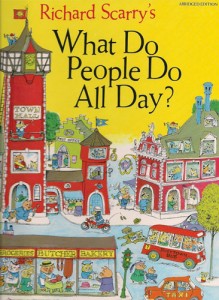 What Do People Do All Day? by Richard Scarry
What Do People Do All Day? by Richard Scarry
Animal characters of all kinds show in detail how people in every profession work together in everyday life. With sweet illustrations that don’t dumb things down, your child will grow fond of these animals in no time.
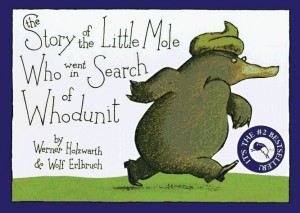 The Story of the Little Mole Who Went in Search of Whodunit by Werner Holzwarth
The Story of the Little Mole Who Went in Search of Whodunit by Werner Holzwarth
Kids giggle as mole comes out of his hole one morning and PLOP! – he gets pooped on. Who knew bathroom humor could be educational? With entertaining but not-too-graphic illustrations, it’s hilarious reading for all ages.
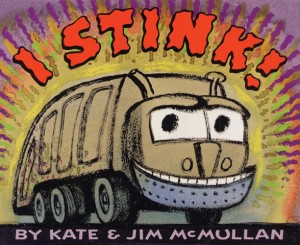 I Stink by Kate and Jim McMullan
I Stink by Kate and Jim McMullan
A night in the life of a garbage truck is just yucky enough to enthrall little boys. Its trashy ABC feast includes dirty diapers, eggshells and fish heads, to name a few. It’s engrossing, really.
Rev Up Your Reading
To foster your child’s love of language, make reading a habit. Share stories at nap time and before bed, and talk about books you are reading. Here are five other ways to engage your little linguist.
- Pretend you’re an actress giving a performance and really play out the language or sounds, says Diane Schoenburg, PhD, a developmental psychologist and mom of two boys in Fresno, Calif. Kids love the cadence and rhythm of storytelling.
- Keep toys nearby that match characters in the stories you’ll read. “Boys tend to be oriented toward the world of objects,” notes McGuinness. Let your son hold an object like one in the book to occupy fidgeting hands and help him connect written words, pictures and objects.
- Let kids see you read – toddlers love to imitate grown-ups, advises Rich. Give your child a picture book and let him read next to you.
- If your son asks you to repeat the story again and again, take advantage of it. Though the characters are familiar, kids continue to be surprised by what happens next, says McGuinness, even if you aren’t. Repetition is stimulating because young kids can’t remember stories well.
- Take reading on the road. Make books available for reading in the car seat or grocery cart. Let your son tell his own story from the pictures.
If reading isn’t your son’s favorite activity, don’t force the issue – story time should be fun for your child. Just try again tomorrow. Someday soon, he’ll be reading to you.
Posted in: Education
Comment Policy: All viewpoints are welcome, but comments should remain relevant. Personal attacks, profanity, and aggressive behavior are not allowed. No spam, advertising, or promoting of products/services. Please, only use your real name and limit the amount of links submitted in your comment.
You Might Also Like...

The Unmotivated Child: Empowering Strategies To Help Your Child Aim Higher
As parents, we want our children to feel excited about learning and to be willing to confront challenging material. We want them to have an endless supply of resilience to […]

Homeschooling Your Children: The Many Approaches and Benefits
Homeschooling is, in its simplest definition, educating a child outside the boundaries of a formal school. It typically means that parents take responsibility for their child’s education. Many people are […]

Shasta College Celebrates 75 Years of Excellence and a Legacy of Community Service
For 75 years, Shasta College has been honored to serve our North State communities by providing affordable access to higher education. It’s a little dizzying to consider how far we’ve […]

Teenage Musicians: Win $400 In Music Store Prizes!
The Music Connection and North State Parent want to hear your story! If you are between the ages of 13 and 17 years old, and live in Upper California, send […]



